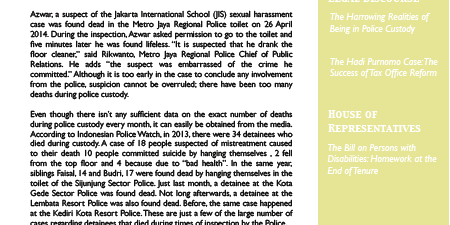Legal Discourse
The Harrowing Realities of Being in Police Custody
Azwar, a suspect of the Jakarta International School (JIS) sexual harassment case was found dead in the Metro Jaya Regional Police toilet on 26 April 2014. During the inspection, Azwar asked permission to go to the toilet and five minutes later he was found lifeless. “It is suspected that he drank the floor cleaner,” said Rikwanto, Metro Jaya Regional Police Chief of Public Relations. He adds “the suspect was embarrassed of the crime he committed.” Although it is too early in the case to conclude any involvement from the police, suspicion cannot be overruled; there have been too many deaths during police custody.
Even though there isn’t any sufficient data on the exact number of deaths during police custody every month, it can easily be obtained from the media. According to Indonesian Police Watch, in 2013, there were 34 detainees who died during custody. A case of 18 people suspected of mistreatment caused to their death 10 people committed suicide by hanging themselves , 2 fell from the top floor and 4 because due to “bad health”. In the same year, siblings Faisal, 14 and Budri, 17 were found dead by hanging themselves in the toilet of the Sijunjung Sector Police. Just last month, a detainee at the Kota Gede Sector Police was found dead. Not long afterwards, a detainee at the Lembata Resort Police was also found dead. Before, the same case happened at the Kediri Kota Resort Police. These are just a few of the large number of cases regarding detainees that died during times of inspection by the Police.
At the very least, cases above prove lack of security and protection towards detainees, regardless of their background and alleged deed. Often in several cases, facts of police as perpetrators leading to deaths have been found. For example, in the Sijunjung case, 9 police officers have been sentenced to disciplinary sanction. In Baubau, locals clashed with the police because of the death of a detainee during police inspection. Because of its confidential characteristic, arbitrariness can be easily done yet difficult to expose. This could only mean that now is the time to urge the police to act more professionally, by immediately forming an independent investigation team to reveal the case. Additionally, in Azwar’s case, the National Police Commission (Komisi Kepolisian Nasional/Kompolnas) found that the liquid floor cleaner did not come from the toilet where Azwar died. Generally, transparency and accountability of police inspections is necessary. Supplying CCTV, unhindered visiting hours and especially access for lawyers to meet their clients are several necessary measurements need to be taken. (MSG)
Legal Discourse
The Hadi Purnomo Case: The Success of Tax Office Reform
The naming of Hadi Purnomo as a suspect comes as no surprise to a lot of people. The former Director General of Taxation has been named as a suspect by the Corruption Eradication Commission of Indonesia (KPK), for his role in giving a tax break worth USD 45 Million from BCA (Bank Central Asia). Considered as the largest privately-owned Indonesia Bank; the BCA case is the biggest tax corruption case handled by KPK so far.
In numerous occasions, KPK and the Indonesian National Police (Polisi Rakyat Indonesia/Polri) have managed to uncover tax corruption cases. The high number of corruption cases uncovered can be seen as successes of reform in the Indonesian tax office. Few people
will see the high number of corruption cases uncovered as the failure
of Indonesian tax office reformation. However, this also should be seen as the success of reform conducted in the Tax office, especially, in the supervision and whistle-blower system. The number of corruption cases has been associated with information given by the whistle-blower system inside the tax office. The case of Hadi Purnomo is no exception. Also the uncovering of Hadi Purnomo cannot be disconnected from role of internal supervision, who reported the case in 2007. (GAT)
House of Representatives
The Bill on Persons with Disabilities: Homework at the End of Tenure
The House of Representatives will start theis sessions in the beginning onf12 May 2014 until their tenure ends in October 2014. During this period of time, the House still have unfinished duties; one of which from the legislation is to finalize the bill on Persons with Disabilities, which will replace Law No. 4 Year 1997 on Disabled People.
The Law on Persons with Disabilities became a Priority Bill on the 2014 National Legislation Program. The bill is still on the preparation stage since The House of Representatives initiative proposal is due to be discussed with the Government. Viewing the process, it is still too early to hope for the Bill to be passed before October 2014. However, this is the challenge towards the House of Representatives in actualizing their commitment and promise towards constituents, especially those with disabilities. On the other hand, if members of the House of Representatives calculate it is impossible to finalize the Bill this year; or if there are other priorities, then the House should address the delay to their constituents so they don’t find it compulsory to wait for the bill to be enacted. (FN)

